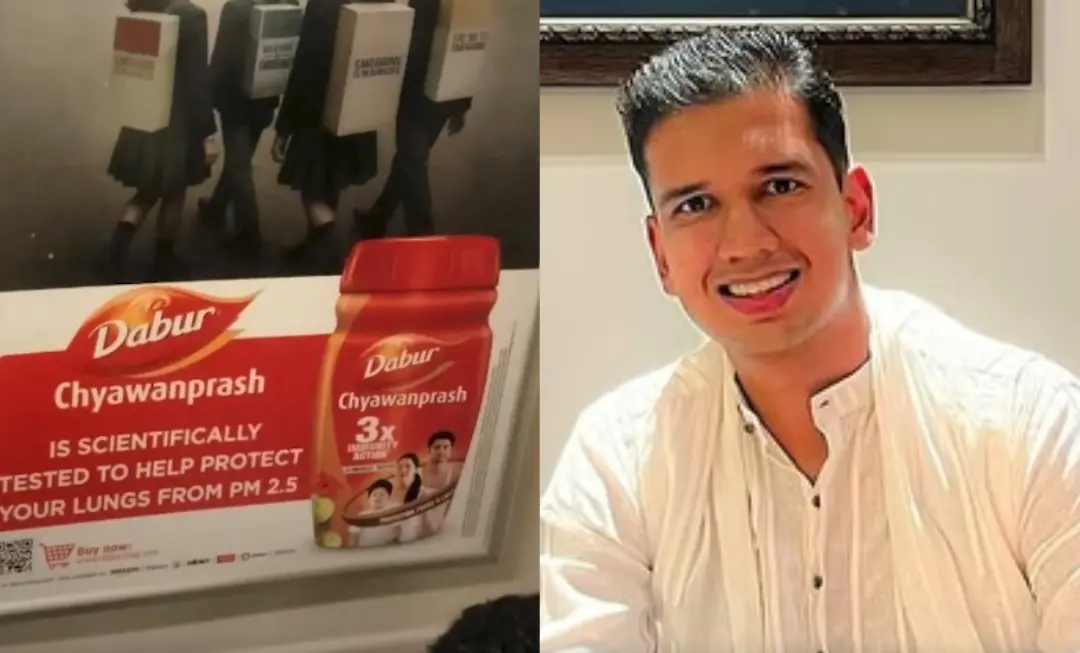Delhi’s air pollution, has become the unlikely backdrop for a viral debate about advertising integrity. Revant Himatsingka delivered a satirical review of Dabur’s new campaign, which claims Chyawanprash “protects lungs from air pollution, especially PM 2.5”. The ads, strategically placed in Delhi Metro and print media alongside grim AQI numbers, assert that eating two spoons a day helps shield citizens from the city’s toxic air.
The Video: Satire Meets Science
Himatsingka sarcastically “congratulated” the company for solving India’s pollution crisis, mock-demonstrating with an air quality meter that Chyawanprash could instantly drop PM2.5 readings in any environment. He lampooned the product’s effectiveness, suggesting that it be used in everything from breakfast idlis to air purifiers, equating Dabur’s marketing with earlier dubious health claims such as Patanjali’s supposed Covid cures.
While the satire drew laughs, his criticism soon turned serious:
Study Flaws: Himatsingka noted that their cited study was conducted on rats, not humans—pointing out the obvious biological gap, and the fact that the research was commissioned and conducted by Dabur employees, highlighting a conflict of interest.Hidden Sugar: He revealed that Chyawanprash contains nearly 60% sugar and questioned Dabur’s use of “sharkara” (Sanskrit for sugar) on the packaging instead of “chini,” suggesting the label obfuscates the unhealthy content.Open Challenge: Instead of legal threats (which he’s faced before from companies like Dabur), Himatsingka dared Dabur to a public debate, proposing unbiased doctors and nutritionists as judges.
Dabur Chyawanprash EXPOSED! Share widely. pic.twitter.com/3aWqieEyEc
— Revant Himatsingka “Food Pharmer” (@foodpharmer2) November 26, 2025 Delhi’s Air Pollution Crisis: The Grim Facts
These claims come as Delhi battles its worst air quality on record. According to a November 2025 assessment:
Annual PM2.5 levels have hit 101μg/m³—over 2.5 times India’s legal limit, and 20 times the WHO guideline.AQI in “severe” to “hazardous” range: Peak readings spiked to 250–436 AQI this week, with average PM2.5 levels hovering around 119–166μg/m³.Health impacts: Prolonged exposure to such pollution can cause chronic respiratory and cardiovascular diseases, especially among children and vulnerable populations.Marketing, Science, and Ethics
This ad campaign has stoked a public backlash. Critics argue its health claims are not only misleading but potentially dangerous. Strategic ad placement next to daily AQI updates heightens the sense that brands are capitalizing on a public health emergency.
Delhi’s pollution crisis remains urgent and deadly. While Ayurvedic remedies like Chyawanprash can be part of an individual’s wellness routine, leading nutritionists—and watchdogs like Himatsingka—insist that no matter how marketed, such products cannot replace evidence-based strategies for combating air pollution or managing respiratory risk.
Read this: Sunfeast Takes Down Dark Fantasy Ad Within 12 Hours After Criticism From Food Pharmer
In Summary: Himatsingka’s viral critique taps into deep public anxiety and skepticism about “wellness” advertising during a real health crisis. As Delhians struggle through another toxic winter, the episode has reignited calls for evidence-backed marketing, stricter regulation, and a renewed focus on clean air as a fundamental right—not a product promise

